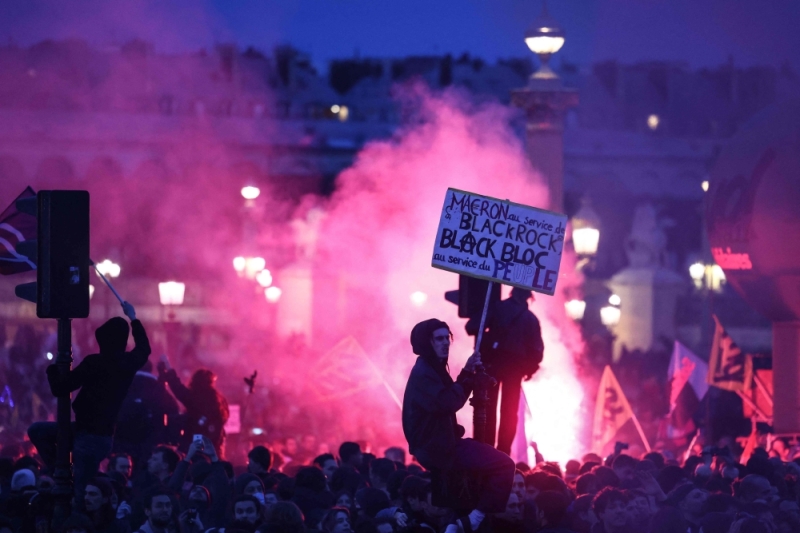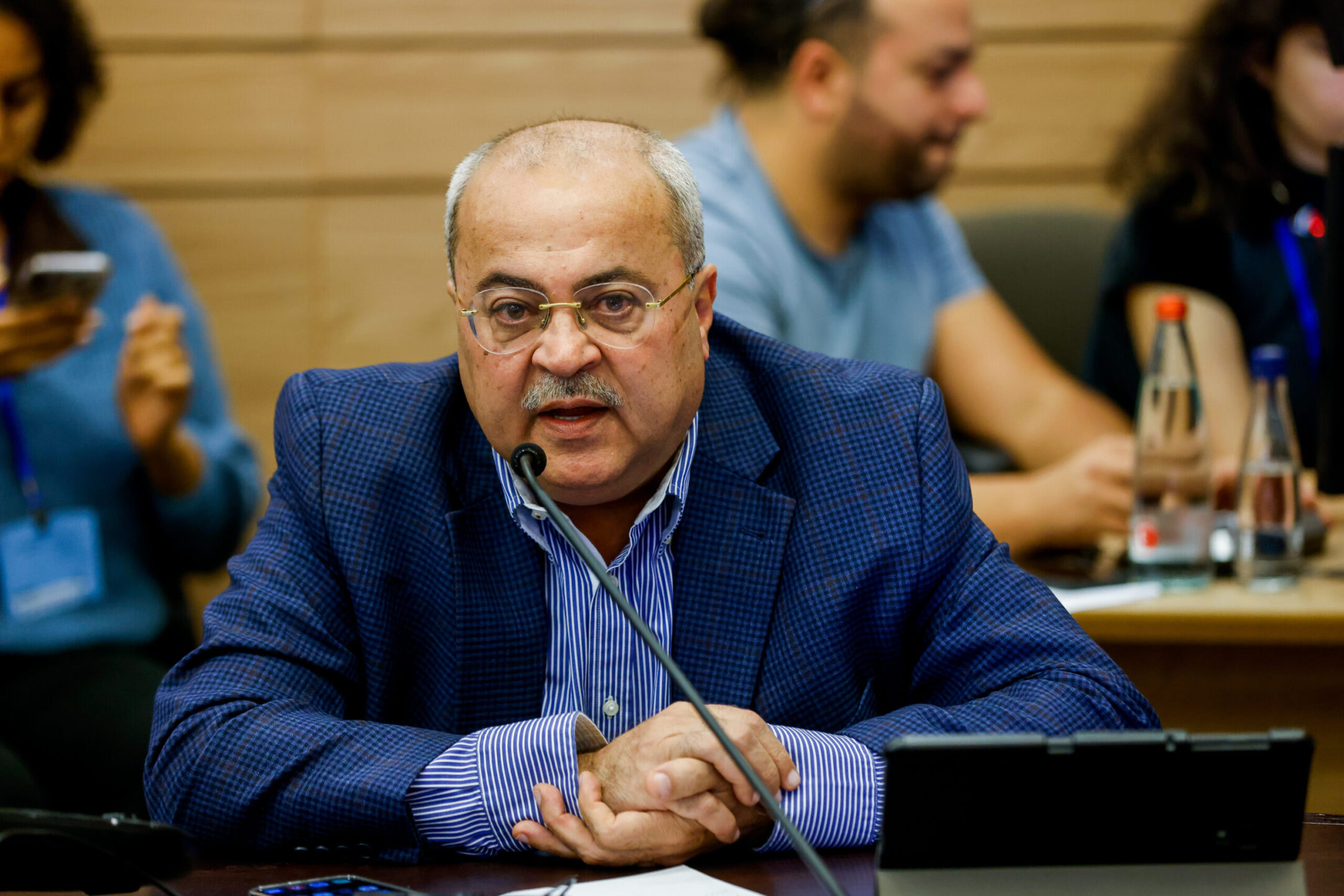French govt faces no-confidence votes over pensions fight

French President Emmanuel Macron’s government on Friday faced no-confidence motions in parliament and intensified protests after imposing a contentious pension reform without a vote in the lower house. — AFP pic
PARIS, March 18 — French President Emmanuel Macron’s government on Friday faced no-confidence motions in parliament and intensified protests after imposing a contentious pension reform without a vote in the lower house.
The situation presents Macron, who has only made occasional public comments on the matter, with one of his biggest challenges less than one year into his second and final mandate.
Prime Minister Elisabeth Borne on Thursday invoked article 49.3 of the constitution to impose the pension overhaul by decree, sparking angry demonstrations nationwide that raged unabated yesterday.
French opposition lawmakers on Friday retaliated by filing motions of no-confidence in the government, hoping to repeal the deeply unpopular law, which will hike the retirement age from 62 to 64.
“The vote on this motion will allow us to get out on top of a deep political crisis,” said lawmaker Bertrand Pancher, whose motion was signed by independents and members of the broad left-wing NUPES coalition.
The far-right National Rally (RN) filed a second motion. It was expected to get less backing, but the party said it would also vote for the other motion.
They are likely to be debated in parliament on Monday afternoon, parliamentary sources told AFP.
Borne’s government is largely expected to survive any vote. The no-confidence motion would need backing from around half the contingent of the opposition right-wing Republicans, a scenario seen as highly improbable.
‘Won’t give up’
Across France, fresh protests erupted on Friday, the latest show of popular opposition to the bill since mid-January.
“We won’t give up,” said Philippe Melaine, a 49-year-old biology teacher. “There’s still hope that the reform can be revoked.”
In Paris, thousands of demonstrators gathered for a second night running at the historic Place de la Concorde across the river from parliament, where a large fire burned.
Groups of people threw bottles and fireworks at the security forces, who responded by firing tear gas to try to clear the square. Police said they made 12 arrests.
In the energy sector, CGT union representative Eric Sellini strikers would halt production at a large refinery by this weekend or Monday.
Strikers continued to deliver less fuel than normal from several other sites, he added.
Dozens of protesters flooded onto the train tracks at the main station in the southwestern city of Bordeaux, an AFP photographer said.
Unions have called for another day of mass strikes and protests for next Thursday, branding the government’s move “a complete denial of democracy”.
“Changing the government or prime minister will not put out this fire, only withdrawing the reform,” said the head of the moderate CFDT union, Laurent Berger.
‘Playing with fire’
Macron put the pensions reform, which also seeks to increase the number of years people have to work to receive a full pension, at the centre of his re-election campaign last year.
But the 45-year-old former banker lost his parliamentary majority in June after elections for the lower-house National Assembly.
Opposition lawmakers jeered and booed as Borne invoked the controversial article 49.3 to ram through the pensions law on Thursday, having failed to ensure a majority.
The influential Le Monde newspaper warned that Macron was “playing with fire”.
“If the country slides into a new bout of anger or locks itself into vengeful paralysis, the executive will only have itself to blame,” it said in an editorial.
Borne, whose own position is now on the line, has used the contested loophole to bypass a parliament vote 11 times since becoming prime minister last year.
RN figurehead Marine Le Pen, who leads its MPs in parliament, has described Thursday’s cabinet move as “a total failure for the government”.
‘Wreaking havoc’
Trains, schools, public services and ports have since January been disrupted by strikes against the proposed reform.
A rolling strike by municipal garbage collectors in Paris has left about 10,000 tonnes of trash piled up in the streets, according to the mayor’s office, attracting rats and putting off tourists.
Unions from national train operator SNCF Friday meanwhile urged workers to continue a rolling strike that has caused major disruption on the network.
Already on Thursday night, police used tear gas to clear demonstrators after a fire was lit at the Place de la Concorde, and similar scenes unfolded across France.
The ensuing unrest saw 310 people arrested around the country, including 258 in Paris, Interior Minister Gerald Darmanin said.
“The opposition is legitimate, the protests are legitimate, but wreaking havoc is not,” he said.
According to polls, two-thirds of French people oppose the pensions overhaul. — AFP
Sylvie Corbet and Barbara Surk
Mar 18 2023
Angry protesters took to the streets in Paris and other cities for a second day on Friday (local time), trying to pressure lawmakers to bring down French President Emmanuel Macron's government and doom the unpopular retirement age increase he's trying to impose without a vote in the National Assembly.
A day after Prime Minister Elisabeth Borne invoked a special constitutional power to skirt a vote in the chaotic lower chamber, lawmakers on the right and left filed no-confidence motions to be voted on Monday.
At the elegant Place de Concorde, a festive protest by several thousand, with chants, dancing and a huge bonfire, degenerated into a scene echoing the night before. Riot police charged and threw tear gas to empty the huge square across from the National Assembly after troublemakers climbed scaffolding on a renovation site, arming themselves with wood. They lobbed fireworks and paving stones at police in a standoff.
On Thursday night, security forces charged and used water cannons to evacuate the area, and small groups then set street fires in chic neighbourhoods nearby. French Interior Minister Gérald Darmanin told radio station RTL that 310 people were arrested overnight, most of them in Paris.
READ MORE:
* Neither protests nor rubbish piles stop French bill that will raise retirement age
* Why France is arguing about work, and the right to be lazy
* French election: Macron in pole position, Le Pen racing hard
* Macron leads French presidential race, despite barely campaigning

Protesters march during a demonstration in Marseille, southern France,
on March 16, 2023.
Mostly small, scattered protests were held in cities around France, from a march in Bordeaux to a rally in Toulouse. Port officers in Calais temporarily stopped ferries from crossing the English Channel to Dover. Some university campuses in Paris were blocked and protesters occupied a high-traffic ring road around the French capital.
Paris garbage collectors extended their strike for a 12th day, with piles of foul-smelling rubbish growing daily in the French capital. Striking sanitation workers continued to block Europe’s largest incineration site and two other sites that treat Paris garbage.
Some yellow vest activists, who mounted formidable protests against Macron’s economic policies during his first term, were among those who relayed Friday's Paris protest on social media. Police say that “radicalised yellow vests” are among troublemakers at protest marches.
Trade unions organising the opposition urged demonstrators to remain peaceful during more strikes and marches in the days ahead. They have called on people to leave schools, factories, refineries and other workplaces to force Macron to abandon his plan to make the French to work two more years, until 64, before receiving a full pension.

Rubbish, which is left on the roadside as Paris rubbish collectors strike,
is set on fire by protesters after a demonstration near Concorde square, in Paris.
Macron took a calculated risk ordering Borne to invoke a special constitutional power that she had used 10 times before without triggering such an outpouring of anger.
If the no-confidence votes fail, the bill becomes law. If a majority agrees, it would spell the end of the retirement reform plan and force the government to resign, although Macron could always reappoint Borne to name the new Cabinet.
“We are not going to stop,” CGT union representative Régis Vieceli told The Associated Press on Friday. He said overwhelming the streets with discontent and refusing to continue working is “the only way that we will get them to back down.”
Macron has made the proposed pension changes the key priority of his second term, arguing that reform is needed to make the French economy more competitive and to keep the pension system from diving into deficit. France, like many richer nations, faces lower birth rates and longer life expectancy.

People run from tear gas fired by French riot police during a
demonstration in Marseille, southern France.
Macron's conservative allies in the Senate passed the bill, but frantic counts of lower-house lawmakers Thursday showed a slight risk it would fall short of a majority, so Macron decided to invoke the constitution's Article 49-3 to bypass a vote.
Getting a no-confidence motion to pass will be challenging – none have succeeded since 1962, and Macron’s centrist alliance still has the most seats in the National Assembly. A minority of conservatives could stray from the Republicans party line, but it remains to be seen whether they're willing to bring down Macron's government.
Associated Press reporters Elaine Ganley, Alex Turnbull and Nicolas Garriga contributed to this report.
:quality(70)/cloudfront-eu-central-1.images.arcpublishing.com/thenational/WALZLEGYPL4TQXIQQMYLMNQTSM.jpg)
:quality(70)/cloudfront-eu-central-1.images.arcpublishing.com/thenational/VQRF5PPUQMEHNFBIIHVEUBZ634.jpg)
:quality(70)/cloudfront-eu-central-1.images.arcpublishing.com/thenational/TDKCPVLZPXUTXFPQJEREL5VLS4.jpg)
:quality(70)/cloudfront-eu-central-1.images.arcpublishing.com/thenational/YUTWM2HWH3AKO3WUN3DPFMVUNQ.jpg)
:quality(70)/cloudfront-eu-central-1.images.arcpublishing.com/thenational/UZOIK7KVI3QK3OQM7D3HVZIDFY.jpg)
:quality(70)/cloudfront-eu-central-1.images.arcpublishing.com/thenational/IKQJB6VRQZOG5NZ4VN33SQIVKU.jpg)
:quality(70)/cloudfront-eu-central-1.images.arcpublishing.com/thenational/VDU6O34M6HJ7YLCB56HY2IHIJU.jpg)
:quality(70)/cloudfront-eu-central-1.images.arcpublishing.com/thenational/HIXGQ2LZY6TK47RG7TPLRSKSJY.jpg)
:quality(70)/cloudfront-eu-central-1.images.arcpublishing.com/thenational/PODT53LNR4LRVKQH6M26OKYZXE.jpg)
:quality(70)/cloudfront-eu-central-1.images.arcpublishing.com/thenational/RC22QMGE65HDBF6NANV6G2JGL4.jpeg)
:quality(70)/cloudfront-eu-central-1.images.arcpublishing.com/thenational/NQS4CCBZKEPQG6HMT6TDJ3PD7A.jpg)
:quality(70)/cloudfront-eu-central-1.images.arcpublishing.com/thenational/ZVXUTSFIFCKLFUQ6FHXI3Z7VS4.jpg)
:quality(70)/cloudfront-eu-central-1.images.arcpublishing.com/thenational/G4YXGMPS76VOUQDM3AR6DR45R4.jpg)
:quality(70)/cloudfront-eu-central-1.images.arcpublishing.com/thenational/665MF7WLAZZIFTZ2JAYWJJVPNI.jpg)
:quality(70)/cloudfront-eu-central-1.images.arcpublishing.com/thenational/GKSYRDVK5PWJVSOLPV5NTCFAPQ.jpg)
:quality(70)/cloudfront-eu-central-1.images.arcpublishing.com/thenational/CEAJ52QHSY3L5BDDUIQPOSZCIM.jpg)
:quality(70)/cloudfront-eu-central-1.images.arcpublishing.com/thenational/TX64ADOBPPI4MYDFPW7WKIV7SI.jpg)
:quality(70)/cloudfront-eu-central-1.images.arcpublishing.com/thenational/NE6OJUSGYZQSUJXPDSYF3TPH4I.jpg)
:quality(70)/cloudfront-eu-central-1.images.arcpublishing.com/thenational/QYL4Q2EH4I7I57DRLN4RVCV2IU.jpg)









